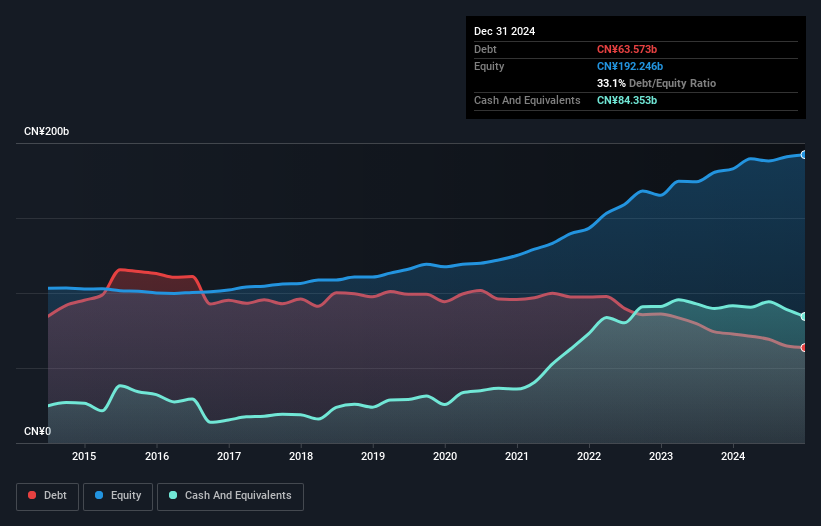Howard Marks put it nicely when he said that, rather than worrying about share price volatility, 'The possibility of permanent loss is the risk I worry about... and every practical investor I know worries about.' So it seems the smart money knows that debt - which is usually involved in bankruptcies - is a very important factor, when you assess how risky a company is. We note that China Coal Energy Company Limited (HKG:1898) does have debt on its balance sheet. But should shareholders be worried about its use of debt?
Our free stock report includes 2 warning signs investors should be aware of before investing in China Coal Energy. Read for free now.When Is Debt A Problem?
Debt is a tool to help businesses grow, but if a business is incapable of paying off its lenders, then it exists at their mercy. If things get really bad, the lenders can take control of the business. However, a more usual (but still expensive) situation is where a company must dilute shareholders at a cheap share price simply to get debt under control. Of course, the upside of debt is that it often represents cheap capital, especially when it replaces dilution in a company with the ability to reinvest at high rates of return. When we examine debt levels, we first consider both cash and debt levels, together.
What Is China Coal Energy's Debt?
You can click the graphic below for the historical numbers, but it shows that China Coal Energy had CN¥63.6b of debt in December 2024, down from CN¥72.7b, one year before. However, it does have CN¥84.4b in cash offsetting this, leading to net cash of CN¥20.8b.

How Strong Is China Coal Energy's Balance Sheet?
The latest balance sheet data shows that China Coal Energy had liabilities of CN¥102.2b due within a year, and liabilities of CN¥63.5b falling due after that. Offsetting this, it had CN¥84.4b in cash and CN¥17.4b in receivables that were due within 12 months. So its liabilities outweigh the sum of its cash and (near-term) receivables by CN¥63.9b.
China Coal Energy has a very large market capitalization of CN¥124.7b, so it could very likely raise cash to ameliorate its balance sheet, if the need arose. But it's clear that we should definitely closely examine whether it can manage its debt without dilution. While it does have liabilities worth noting, China Coal Energy also has more cash than debt, so we're pretty confident it can manage its debt safely.
See our latest analysis for China Coal Energy
But the other side of the story is that China Coal Energy saw its EBIT decline by 5.5% over the last year. If earnings continue to decline at that rate the company may have increasing difficulty managing its debt load. When analysing debt levels, the balance sheet is the obvious place to start. But it is future earnings, more than anything, that will determine China Coal Energy's ability to maintain a healthy balance sheet going forward. So if you're focused on the future you can check out this free report showing analyst profit forecasts.
Finally, a company can only pay off debt with cold hard cash, not accounting profits. While China Coal Energy has net cash on its balance sheet, it's still worth taking a look at its ability to convert earnings before interest and tax (EBIT) to free cash flow, to help us understand how quickly it is building (or eroding) that cash balance. During the last three years, China Coal Energy produced sturdy free cash flow equating to 72% of its EBIT, about what we'd expect. This cold hard cash means it can reduce its debt when it wants to.
Summing Up
Although China Coal Energy's balance sheet isn't particularly strong, due to the total liabilities, it is clearly positive to see that it has net cash of CN¥20.8b. And it impressed us with free cash flow of CN¥16b, being 72% of its EBIT. So we are not troubled with China Coal Energy's debt use. There's no doubt that we learn most about debt from the balance sheet. But ultimately, every company can contain risks that exist outside of the balance sheet. To that end, you should learn about the 2 warning signs we've spotted with China Coal Energy (including 1 which is potentially serious) .
If, after all that, you're more interested in a fast growing company with a rock-solid balance sheet, then check out our list of net cash growth stocks without delay.
New: AI Stock Screener & Alerts
Our new AI Stock Screener scans the market every day to uncover opportunities.
• Dividend Powerhouses (3%+ Yield)
• Undervalued Small Caps with Insider Buying
• High growth Tech and AI Companies
Or build your own from over 50 metrics.
Have feedback on this article? Concerned about the content? Get in touch with us directly. Alternatively, email editorial-team (at) simplywallst.com.
This article by Simply Wall St is general in nature. We provide commentary based on historical data and analyst forecasts only using an unbiased methodology and our articles are not intended to be financial advice. It does not constitute a recommendation to buy or sell any stock, and does not take account of your objectives, or your financial situation. We aim to bring you long-term focused analysis driven by fundamental data. Note that our analysis may not factor in the latest price-sensitive company announcements or qualitative material. Simply Wall St has no position in any stocks mentioned.
About SEHK:1898
China Coal Energy
China Coal Energy Company Limited mines, produces, processes, trades in, and sells coal in the People’s Republic of China and internationally.
Flawless balance sheet with solid track record.
Similar Companies
Market Insights
Community Narratives



